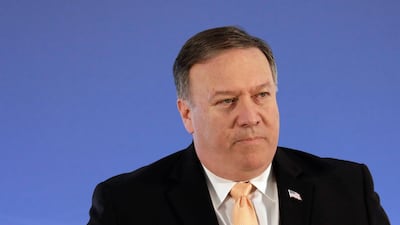Iran's support for the Houthi rebels has not only enabled attacks on the UAE and Saudi Arabia but also risks making making the humanitarian crisis in Yemen worse, US Secretary of State Mike Pompeo said.
Iranian supreme leader Ayatollah Ali Khomenei should be held directly responsible for destabilising the Gulf region and "prolonging the suffering of the Yemeni people", Mr Pompeo said in a tweet.
The secretary of state's comments come as the Saudi-led Arab Coalition and Yemeni government forces prepare to retake the vital port city of Hodeidah, through which the bulk of Yemen's food imports and humanitarian supplies are shipped.
The Houthi rebels have used their control of the port to profit from selective distribution of aid and to smuggle in weapons supplied by Iran, including missiles that have have been fired into Saudi Arabia.
The US, which is supporting the coalition campaign in Yemen through sharing of intelligence and mid-air refuelling for its fighter jets, has repeatedly criticised Iran for its interference in the region using proxy forces.
_______________
Read more:
Arab Coalition: military pressure is bringing Houthis to negotiation table
Houthis cut water and electricity to Hodeidah residents
Iran FM echoes Pompeo in Twitter rebuttal over protests
_______________
The Houthi rebels have so far refused a coalition offer allowing them to withdraw from Hodeidah in order to avert a battle for the city that would endanger civilian lives and disrupt the unloading and distribution of much needed aid.
However, coalition officials say the heavy losses suffered by the rebels across Yemen have forced them into negotiations with the UN envoy for Yemen, Martin Griffiths, who has been engaged in shuttle diplomacy to prevent an all-out battle for Hodeidah.

